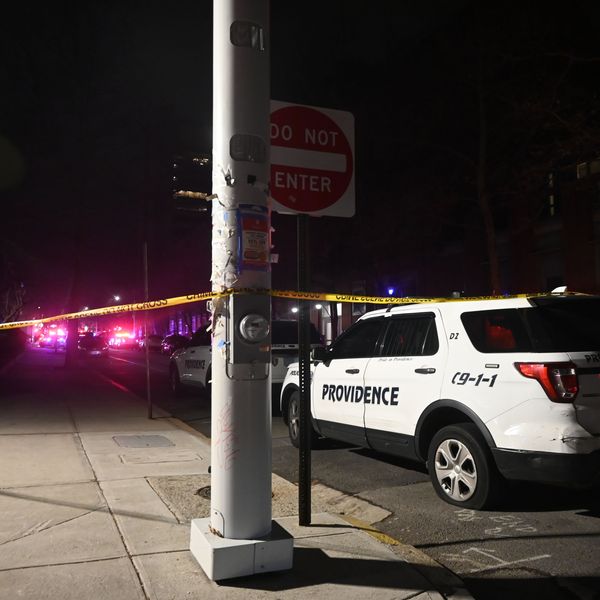Democrats Vow More Action as House Adjourns With No Vote on Guns
Civil rights advocates warned that focus on watch list endorses controversial process that may not prevent massacres
Democrats in the U.S. House of Representatives ended their overnight sit-in demanding gun reform Thursday morning after Republicans formally adjourned the legislative session until July 5.
More than a dozen Democrats, led by Rep. John Lewis (D-Georgia) remained on the chamber floor, although it is unclear how their efforts to force a vote on gun control will proceed as House Speaker Paul Ryan (R-Wis.) ended the session--earlier than scheduled.
As Politico reports, "The Wisconsin Republican entered the chamber at 10 p.m. to break up the protest by moving to a vote on unrelated legislation to override an Obama administration rule. Pandemonium ensued, a scene not witnessed on the House floor in years, if ever."
Democrats, who shouted "Shame! Shame!" and "No bill, no break!" as business continued, slammed Republicans for being "silent for too long" about mass shootings in the U.S. The protest was mounted after the U.S. Senate failed to pass several measures that would have expanded background checks and prevented gun sales to people on two terrorist watch lists, including the controversial No Fly list, introduced in response to the attack on an LGBTQ nightclub in Orlando earlier this month that left 49 dead and 53 wounded.
"Today we've come a distance. We've made some progress. We've crossed a bridge today, but we have other bridges to cross," Lewis said after the House adjourned. "The fight is an ongoing fight. We will not be happy, we will not be satisfied, we will not be pleased until we do something in a major way."
Republicans, meanwhile, claimed the sit-in was nothing more than a PR stunt.
As the lawmakers squabbled, civil rights advocates warned that the focus on the terrorist watch list may amount to an endorsement of a process that disproportionately targets Muslims and would not do enough to prevent future massacres.
Zaid Jilani of The Intercept noted that "this unusually bold and moving tactic was undercut by the fact that its chief goal is a political gimmick that would do little to stop gun violence, while expanding the use of a deeply flawed anti-terror watchlist."
Jilani wrote:
While sit-in participants are also advocating for expanded background checks and an assault weapons ban, their primary call to action is for a vote on a measure that would ban gun sales to people listed on a federal government watchlist - a move clearly designed more for its political potency than for its effectiveness.
As the Guardian's Spencer Ackerman reported on Wednesday, lawyers and American Muslim groups fear that "civil rights concerns over watchlisting are becoming a casualty of political expediency by gun control advocates in a debate supercharged by the massacre of 49 people at an LGBT nightclub in Orlando on 12 June."
Ramzi Kassem, a law professor at the City University of New York (CUNY), some of whose clients have been wrongly placed on the list, told Ackerman, "It's ridiculous, the notion that somehow the watchlists are a reliable measuring stick for who should be deprived of an ability to purchase weapons. The discussion on gun control vastly overstates the reliability of the watchlists. They lack transparency and any available process to get off the lists if people believe they've been wrongly listed."
An Urgent Message From Our Co-Founder
Dear Common Dreams reader, The U.S. is on a fast track to authoritarianism like nothing I've ever seen. Meanwhile, corporate news outlets are utterly capitulating to Trump, twisting their coverage to avoid drawing his ire while lining up to stuff cash in his pockets. That's why I believe that Common Dreams is doing the best and most consequential reporting that we've ever done. Our small but mighty team is a progressive reporting powerhouse, covering the news every day that the corporate media never will. Our mission has always been simple: To inform. To inspire. And to ignite change for the common good. Now here's the key piece that I want all our readers to understand: None of this would be possible without your financial support. That's not just some fundraising cliche. It's the absolute and literal truth. We don't accept corporate advertising and never will. We don't have a paywall because we don't think people should be blocked from critical news based on their ability to pay. Everything we do is funded by the donations of readers like you. Will you donate now to help power the nonprofit, independent reporting of Common Dreams? Thank you for being a vital member of our community. Together, we can keep independent journalism alive when it’s needed most. - Craig Brown, Co-founder |
Democrats in the U.S. House of Representatives ended their overnight sit-in demanding gun reform Thursday morning after Republicans formally adjourned the legislative session until July 5.
More than a dozen Democrats, led by Rep. John Lewis (D-Georgia) remained on the chamber floor, although it is unclear how their efforts to force a vote on gun control will proceed as House Speaker Paul Ryan (R-Wis.) ended the session--earlier than scheduled.
As Politico reports, "The Wisconsin Republican entered the chamber at 10 p.m. to break up the protest by moving to a vote on unrelated legislation to override an Obama administration rule. Pandemonium ensued, a scene not witnessed on the House floor in years, if ever."
Democrats, who shouted "Shame! Shame!" and "No bill, no break!" as business continued, slammed Republicans for being "silent for too long" about mass shootings in the U.S. The protest was mounted after the U.S. Senate failed to pass several measures that would have expanded background checks and prevented gun sales to people on two terrorist watch lists, including the controversial No Fly list, introduced in response to the attack on an LGBTQ nightclub in Orlando earlier this month that left 49 dead and 53 wounded.
"Today we've come a distance. We've made some progress. We've crossed a bridge today, but we have other bridges to cross," Lewis said after the House adjourned. "The fight is an ongoing fight. We will not be happy, we will not be satisfied, we will not be pleased until we do something in a major way."
Republicans, meanwhile, claimed the sit-in was nothing more than a PR stunt.
As the lawmakers squabbled, civil rights advocates warned that the focus on the terrorist watch list may amount to an endorsement of a process that disproportionately targets Muslims and would not do enough to prevent future massacres.
Zaid Jilani of The Intercept noted that "this unusually bold and moving tactic was undercut by the fact that its chief goal is a political gimmick that would do little to stop gun violence, while expanding the use of a deeply flawed anti-terror watchlist."
Jilani wrote:
While sit-in participants are also advocating for expanded background checks and an assault weapons ban, their primary call to action is for a vote on a measure that would ban gun sales to people listed on a federal government watchlist - a move clearly designed more for its political potency than for its effectiveness.
As the Guardian's Spencer Ackerman reported on Wednesday, lawyers and American Muslim groups fear that "civil rights concerns over watchlisting are becoming a casualty of political expediency by gun control advocates in a debate supercharged by the massacre of 49 people at an LGBT nightclub in Orlando on 12 June."
Ramzi Kassem, a law professor at the City University of New York (CUNY), some of whose clients have been wrongly placed on the list, told Ackerman, "It's ridiculous, the notion that somehow the watchlists are a reliable measuring stick for who should be deprived of an ability to purchase weapons. The discussion on gun control vastly overstates the reliability of the watchlists. They lack transparency and any available process to get off the lists if people believe they've been wrongly listed."
Democrats in the U.S. House of Representatives ended their overnight sit-in demanding gun reform Thursday morning after Republicans formally adjourned the legislative session until July 5.
More than a dozen Democrats, led by Rep. John Lewis (D-Georgia) remained on the chamber floor, although it is unclear how their efforts to force a vote on gun control will proceed as House Speaker Paul Ryan (R-Wis.) ended the session--earlier than scheduled.
As Politico reports, "The Wisconsin Republican entered the chamber at 10 p.m. to break up the protest by moving to a vote on unrelated legislation to override an Obama administration rule. Pandemonium ensued, a scene not witnessed on the House floor in years, if ever."
Democrats, who shouted "Shame! Shame!" and "No bill, no break!" as business continued, slammed Republicans for being "silent for too long" about mass shootings in the U.S. The protest was mounted after the U.S. Senate failed to pass several measures that would have expanded background checks and prevented gun sales to people on two terrorist watch lists, including the controversial No Fly list, introduced in response to the attack on an LGBTQ nightclub in Orlando earlier this month that left 49 dead and 53 wounded.
"Today we've come a distance. We've made some progress. We've crossed a bridge today, but we have other bridges to cross," Lewis said after the House adjourned. "The fight is an ongoing fight. We will not be happy, we will not be satisfied, we will not be pleased until we do something in a major way."
Republicans, meanwhile, claimed the sit-in was nothing more than a PR stunt.
As the lawmakers squabbled, civil rights advocates warned that the focus on the terrorist watch list may amount to an endorsement of a process that disproportionately targets Muslims and would not do enough to prevent future massacres.
Zaid Jilani of The Intercept noted that "this unusually bold and moving tactic was undercut by the fact that its chief goal is a political gimmick that would do little to stop gun violence, while expanding the use of a deeply flawed anti-terror watchlist."
Jilani wrote:
While sit-in participants are also advocating for expanded background checks and an assault weapons ban, their primary call to action is for a vote on a measure that would ban gun sales to people listed on a federal government watchlist - a move clearly designed more for its political potency than for its effectiveness.
As the Guardian's Spencer Ackerman reported on Wednesday, lawyers and American Muslim groups fear that "civil rights concerns over watchlisting are becoming a casualty of political expediency by gun control advocates in a debate supercharged by the massacre of 49 people at an LGBT nightclub in Orlando on 12 June."
Ramzi Kassem, a law professor at the City University of New York (CUNY), some of whose clients have been wrongly placed on the list, told Ackerman, "It's ridiculous, the notion that somehow the watchlists are a reliable measuring stick for who should be deprived of an ability to purchase weapons. The discussion on gun control vastly overstates the reliability of the watchlists. They lack transparency and any available process to get off the lists if people believe they've been wrongly listed."


